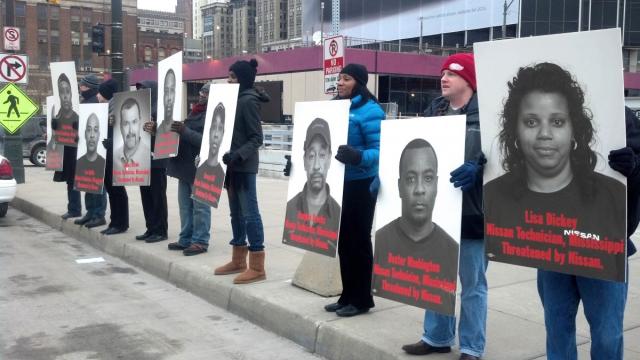
Community leaders, elected officials, faith leaders, labor unions, student groups and racial justice organizations came out firing last week again Nissan for its civil rights abuses against African-American workers, leading protests in Nashville and Atlanta ahead of further actions planned across the South.
Specifically, the coalition, called Mississippi Alliance for Fairness at Nissan (MAFFAN), is launching region-wide efforts to educate consumers about Nissan's treatment of workers at its manufacturing plant in Canton, Mississippi. Of the roughly 5,000 workers at the carmaker's Canton plant, an estimated 80 percent are African-American.
Now, calls are growing to let the workers form a union, something that hasn't been allowed.
"The right to organize and form a union is a basic right here in America. It's how workers represent their interests and make sure that their workplace rights are respected,” said Georgia State Senator and Atlanta mayoral candidate Vincent Fort. “We must support these workers and insist that Nissan, and every other company, respect that right."
In addition to last week's protests in Nashville and Atlanta, peaceful protests happened Saturday at Nissan dealerships in Birmingham, Alabama; Charlotte, North Carolina; Greensboro, North Carolina; New Orleans; and Raleigh, North Carolina. Many Nissan vehicles on the road in these cities were assembled at the carmaker’s plant in Canton.
The protests are being led by local advocacy groups along with MAFFAN, comprised of civil rights leaders, ministers, worker advocates and others. In each city across the region, local delegations are hand-delivering letters on behalf of MAFFAN to Nissan dealers detailing the mistreatment of workers in Canton and calling for an end to the company’s anti-union position.
Nissan began operating in Canton in 2003 amid high hopes for Magnolia State workers. But despite expectations that the plant would “bring quality jobs to our community for years to come, over time Nissan has decided to take a different path,” wrote Dr. Isiac Jackson, chairman of MAFFAN, in letters delivered to Nissan dealers. “Today, the company exploits its predominantly African-American workforce in a variety of ways.”
Among other examples, Jackson pointed to punishing production quotas in the Canton plant as well as a lack of adequate safety equipment. The company has relied heavily on temporary employment agencies for hiring, paying lower wages to temporary employees for the same work as permanent workers. Nissan management has run a campaign of coercion and intimidation to keep workers from speaking about the union.
Problems at Nissan’s Canton plant have been intensifying in recent years. In late 2015, the National Labor Relations Board charged Nissan and a temporary worker agency with violating workers’ rights in Mississippi. Last year, the Occupational Safety and Health Administration cited repeated hazards at the Canton plant.
"Workers are getting hurt at Nissan in Mississippi, but the company threatens to fire workers or close the plant if we organize a union," said Everlyn Cage, who worked at Canton for ten years and was fired after getting injured on the job. "We're letting Nissan – and other companies in the South – know that we aren't standing for these violations of our rights."
Nissan’s Canton plant does not have an employee union. Protestors want Nissan to stop conducting anti-union activities at both locations, and allow free and fair elections among employees who want union representation.
“Nissan spends hundreds of millions of dollars a year marketing itself as a socially responsible carmaker,” said Rev. Gregory Williams of Power Community Church in Atlanta. “It is unacceptable for Nissan to violate the civil rights of African American workers in Mississippi. Whether it’s in Mississippi or here in Atlanta we refuse to allow any major company and employer like Nissan to treat the African American community this way in 2017. It’s time for Nissan dealers and customers to recognize that what they’re selling and buying just doesn’t fit the image of what Nissan claims it’s producing.”
3 WAYS TO SHOW YOUR SUPPORT
- Log in to post comments















Comments
DH Fabian replied on
It's about unions, not race
Phasing out unions, and blocking workers from starting unions, has been the norm since the 1980s, irrespective of race. US workers who are represented by a union went from 20.1% of all workers in 1983, down to 10.7% by 2016.